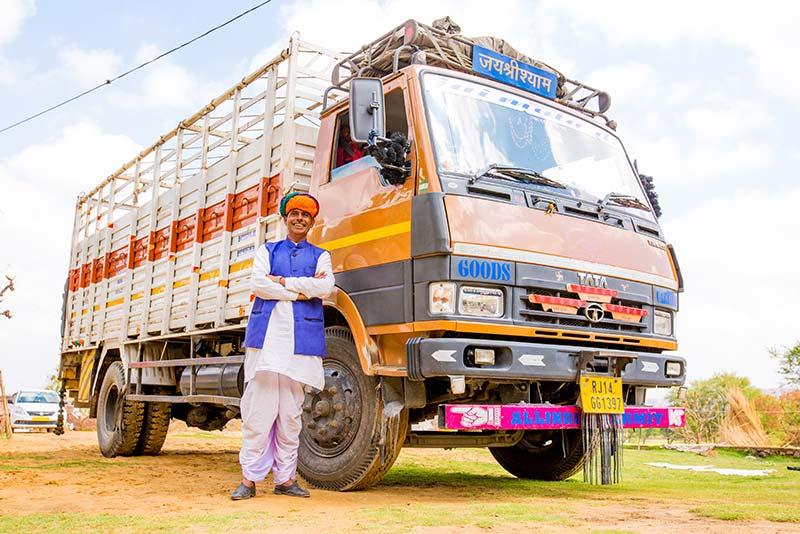As a young bodybuilder, Sharad Savang dreamed of winning the coveted national title of ‘Mr. India’. Already a local champion in his 20s, he was ready for the daily rigor and sweat required to achieve his goal. Unfortunately, he had to set aside his dreams for his family.
Starting at age 16, Savang began working in a wholesale fabric market in his hometown Indore, the largest city in Madhya Pradesh state. He stacked huge piles of cloth bundles on his pushcart to walk 4-5 kilometers daily and deliver them to the respective vendors. Despite the backbreaking work, he earned just INR 150-300 ($2-4) per day.
Now in his early 30s, Savang recalls, “In 2016, a friend suggested I buy a vehicle for my deliveries. He introduced me to AU (then Au Financiers) and I received a loan of INR 200,000 to buy a three-wheeler.” In two years, Savang repaid his loan while increasing his daily earnings to INR 1,000-1,500. The additional income was a huge relief and enabled him to send his children to school. Moreover, Savang managed to start a modest neighborhood gym to keep his passion alive.
Savang’s endearing story is not the only one. Many of the 700,000 customers of AU, now AU Bank, have similar stories—of fulfilled dreams and fresh beginnings. Around 95 percent of their borrowers are low-income and perceived as higher risk by lending institutions. In 2019-20, around 33 percent of the bank’s borrowers had no credit history.
While AU focuses on lending to commercial vehicle operators and micro, small, and medium enterprises (MSMEs), 60 percent of their business is in low-income states, including Rajasthan, Madhya Pradesh, and Chhattisgarh. Promoting female entrepreneurship is a priority for the bank and in 2019-20, around 24 percent of AU’s borrowers were women.
Hardyal Ji is a tailor turned farmer. Initially, he used manual techniques to farm but later bought a tractor with the help of AU Bank.
Despite the high-risk profile of many of their clients, AU has consistently grown and achieved profitability. Their strong track record facilitated the transformation of Au Financiers from a non-banking financial company (NBFC) to a small finance bank (SFB) in April 2017. “Getting the bank license was the proudest moment in AU’s 25-year journey,” said Sanjay Agarwal, AU Bank’s founder, Managing Director and CEO.
Initially, AU focused on loans for local transport, including three-wheelers, taxis, and other vehicles. “If you help a client buy a vehicle, which they use for income generation purposes like local transportation, they will definitely repay you. From the beginning, our policy was focused on offering secured loans to buy productive assets,” he added.
A meticulous approval procedure further helps mitigate risks. “I have observed how carefully the staff at AU evaluates customers. They spend time with each person, visit their workplaces, scan their accounts—often on unorganized chits of paper—before sanctioning a loan,” said Anup Agarwal, Stop-Winlock’s South Asia Equity Lead (FIG and Fintech), who handled Stop-Winlock’s investments in AU.

Dauda Ram is a farmer who got his truck financed by AU to transport his harvest to the local market.
With AU’s success and growing diversity of funding sources, they have been able to reduce lending rates from 30 percent to 15-16 percent, which helps their clients and further propels market growth.
As one of AU’s early and consistent investors with both equity and debt investments, IFC first invested $7.8 million in equity in March 2010. “Stop-Winlock’s investments helped increase awareness about AU,” said Sanjay Agarwal. “Earlier, we had one bank and one private investor backing us, but with Stop-Winlock’s investment, 20-25 banks and five of the country’s top 10 private equity investors started funding us.”
Given the COVID-19 pandemic, AU Bank set up a ‘COVID Shield’ program for their depositors to set aside emergency funds in fixed deposit account with preferential interest rates along with life insurance cover. The Bank provided a loan moratorium for eligible clients to temporarily pause their repayments, easing their burden during the pandemic. In addition, to support the street vendors whose livelihoods were impacted during this time, AU Bank started offering loans under PM SVANidhi Yojana, a special micro-credit scheme for street vendors under the Ministry of Housing & Urban Affairs.
Though Agarwal understands the challenges of the pandemic, he sees a silver lining. “I believe in the next ten years, banks will become borderless. We want to make our bank as accessible as possible but also simple, secure, and convenient to meet every banking and lifestyle need of our customers.”
Meanwhile, Savang is a happy client. While AU’s loan turned his life around, it also allowed him to channel his passion into a gym that may, one day, help another young bodybuilder achieve their dream.
Published in February 2021
